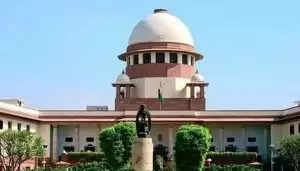Supreme Court Mandates Timely Decisions on Bills Reserved by Governors
Supreme Court's Landmark Ruling

New Delhi: In a significant ruling, the Supreme Court has established that the President must make decisions on bills reserved by governors within three months of receiving them.
This decision follows the court's approval of ten bills that had been held up by Tamil Nadu Governor R N Ravi for presidential review. The comprehensive judgment, spanning 415 pages, was made available on the Supreme Court's website late Friday night.
The court stated, "We find it fitting to adopt the timeline set by the Ministry of Home Affairs... and mandate that the President must decide on bills reserved by the Governor within three months of receipt."
Should there be any delays beyond this timeframe, the reasons must be documented and communicated to the respective State. The States are also expected to cooperate by promptly addressing any inquiries and considering suggestions from the Central government.
A bench comprising Justices JB Pardiwala and R Mahadevan ruled on April 8, declaring the reservation of the ten bills for presidential consideration as illegal and erroneous.
The court emphasized that if a Governor reserves a bill for presidential consideration and the President withholds assent, the State Government has the right to challenge this action in court.
According to Article 200 of the Constitution, the Governor has the authority to either assent to bills, withhold assent, or reserve them for presidential consideration.
The court noted that the bills had been pending with the Governor for an excessively long time, and the Governor's actions indicated a lack of good faith in reserving the bills for the President's review, thus they are considered to have been assented to by the Governor on the date they were presented after reconsideration.
While Article 200 does not specify a time limit for the Governor's actions, the court asserted that it should not be interpreted to allow the Governor to delay or obstruct the legislative process.
The court reiterated that the Governor must follow the advice of the Council of Ministers and cannot reserve a bill for presidential consideration after it has been presented to him a second time.
The Supreme Court directed that copies of this judgment be sent to all high courts and the principal secretaries of governors across all states.
The court established timelines for compliance, stating that failure to adhere to these timelines would subject the governors' inaction to judicial review.
In cases of withholding assent or reserving bills for presidential consideration against the advice of the State Council of Ministers, the Governor is expected to act promptly, within a maximum of one month.
If the Governor withholds assent contrary to the Council's advice, he must return the bill with a message within three months.
In instances where bills are reserved for presidential consideration against the Council's advice, this must also occur within three months.
The court clarified that upon re-presentation of a bill, the Governor must grant assent immediately, within a month at most.
The bench stated that the Governor cannot indefinitely delay bills or exercise an 'absolute veto' or 'pocket veto.'
The court highlighted that there is no provision for a 'pocket veto' or 'absolute veto' for the President under Article 201, emphasizing that the President must choose to either grant or withhold assent to a bill.
The constitutional framework does not permit arbitrary exercise of powers by constitutional authorities.
Utilizing its plenary power under Article 142, the Supreme Court deemed the bill re-presented to the Tamil Nadu Governor as passed.
The apex court had previously posed questions regarding the dispute between the Tamil Nadu government and the Governor over delays in bill assent.
The Governor's delay in granting assent led the state government to approach the Supreme Court in 2023, citing that twelve bills, including one from 2020, were pending.
On November 13, 2023, the Governor announced he was withholding assent to ten bills, prompting the legislative assembly to convene a special session and re-enact the same bills on November 18, 2023.
Subsequently, some of these bills were reserved for presidential consideration.
